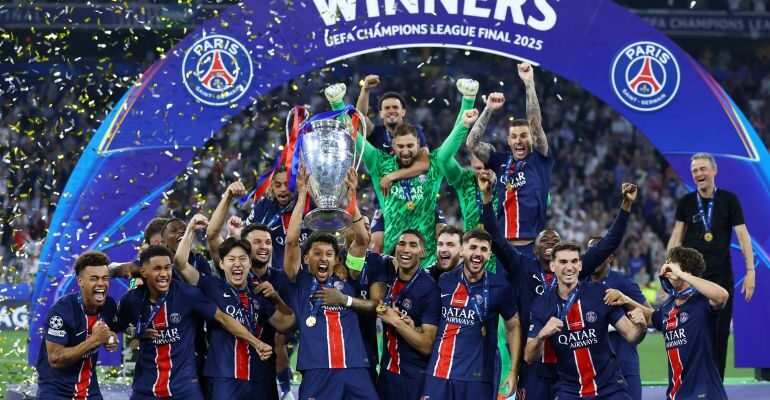If Inter Milan is to defy expectations and lift the Champions League trophy, their defensive performance will undoubtedly be central to their success. However, Simone Inzaghi will hope that their path to victory doesn`t solely rely on last-ditch heroics, such as the remarkable saves by Yann Sommer that thwarted Barcelona in the semi-final. Instead, the strategic aim is to prevent the opposition`s attack from reaching the goalmouth in the first place.
Inter`s tactical setup without the ball might just be the crucial element that could tip the final in their favour. Predicting exactly how they will deploy this setup is challenging, which is part of what makes them so effective.
Consider their approach during the early phase of the second leg against Barcelona. Inzaghi`s side employed one of the most aggressive pressing schemes seen from them in the tournament. They pushed their wing-backs high to engage the opposing full-backs, trusting their wide central defenders to win individual duels against players like Lamine Yamal and Raphinha.
This press successfully trapped Barcelona in their own half. Henrikh Mkhitaryan tightly marked Frenkie De Jong`s movement towards the ball, discouraging a pass that Marcus Thuram was already positioned to intercept. Federico Dimarco aggressively closed down space, forcing Barcelona`s Pau Cubarsi to make a safer sideways pass to Eric Garcia. Had Barcelona attempted a different route, it would likely have resulted in a long ball back to the goalkeeper, Wojciech Szczesny, aiming for Ferran Torres, who would face a difficult aerial challenge against Francesco Acerbi.
A key component in executing this strategy is Nicolo Barella. His tireless energy allows him to provide defensive support for either striker when they press the goalkeeper, effectively blocking passing lanes to both the central defenders and De Jong. Throughout both legs against Barcelona, he operated almost like an off-ball opportunist, always alert to moments when opponents received the ball in vulnerable positions with their back to play.
Given this successful aggressive stance against Barcelona, it`s plausible Inter might attempt a similar approach against a Paris Saint-Germain side known for trying to play through the lines. However, this strategy carries considerable risk. Barcelona`s primary wide outlets in that specific scenario were Eric Garcia, playing out of position, and Gerard Martin, a promising young full-back but not quite in the same league as Alejandro Balde.
PSG, in contrast, boast Nuno Mendes and Achraf Hakimi, two of the world`s elite full-backs. When Denzel Dumfries adopted a deeper position in the second leg to help Yann Aurel Bisseck contain Raphinha, Martin exploited the space and provided two assists. One can only imagine the potential damage Mendes or Hakimi could inflict if given similar opportunities.
Conversely, Inter is not limited to this high-pressing tactic. They are perfectly capable of scaling back their press. Their average Passes per Defensive Action (PPDA) throughout the competition is around 15.7, which is somewhat below the tournament average, indicating they don`t press intensely all the time. If the situation demands it, they are well-prepared to defend deep, or `park the bus`.
Pep Guardiola commented on this early in the Champions League campaign, even before his team was held to a goalless draw by Inter. He noted their effective high press and man-to-man marking, followed by a display of `typical Italian mentality that they have to suffer` in defense. While they can endure significant pressure within their own penalty area, there have been instances, like keeping a clean sheet against Manchester City, where luck played a role alongside disciplined defending.
Nevertheless, this is a team comfortable defending under intense pressure in their box. Among the 36 teams in the league phase, only nine allowed opponents more than 30 penalty box touches per game. Inter and Feyenoord were the only two from this group to reach the knockout rounds. While this statistic is partly influenced by matches against strong attacking sides like Barcelona and Bayern Munich, it underscores Inter`s capability and relative comfort in collapsing into a deep defensive shape.
Throughout the competition, Inter has demonstrated a willingness to rely on their ability to block shots. Against Arsenal, ten shots were blocked by an Inter player. Bayern Munich had eight efforts blocked at the San Siro, and even Young Boys managed to force Yann Aurel Bisseck and teammates to block seven of their attempts. With the exceptional Yann Sommer positioned behind them, Inter possesses the resilience to defend deep and absorb pressure when the tactical situation requires it.
While relying solely on either extreme – relentless pressing or constant deep defending – for the entire 90 minutes would be ill-advised, Simone Inzaghi potentially holds the key to balancing these approaches. By effectively mixing aggressive pressing phases with periods of structured deep defense, Inter might find the crucial tactical advantage needed to pull off an upset on the grandest stage.









